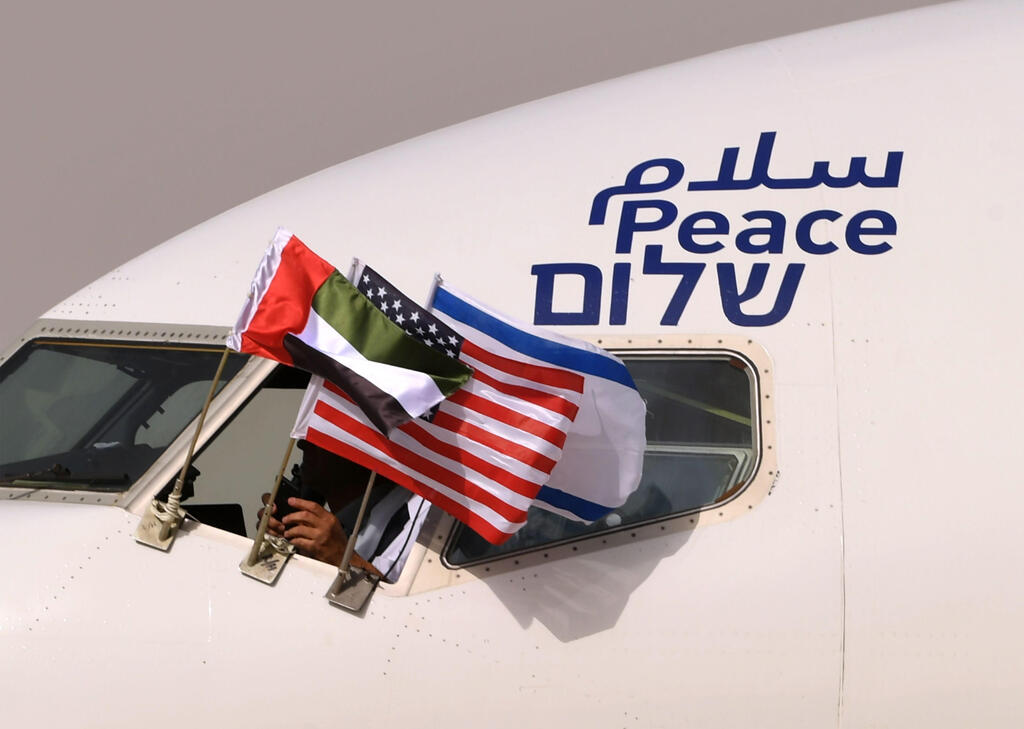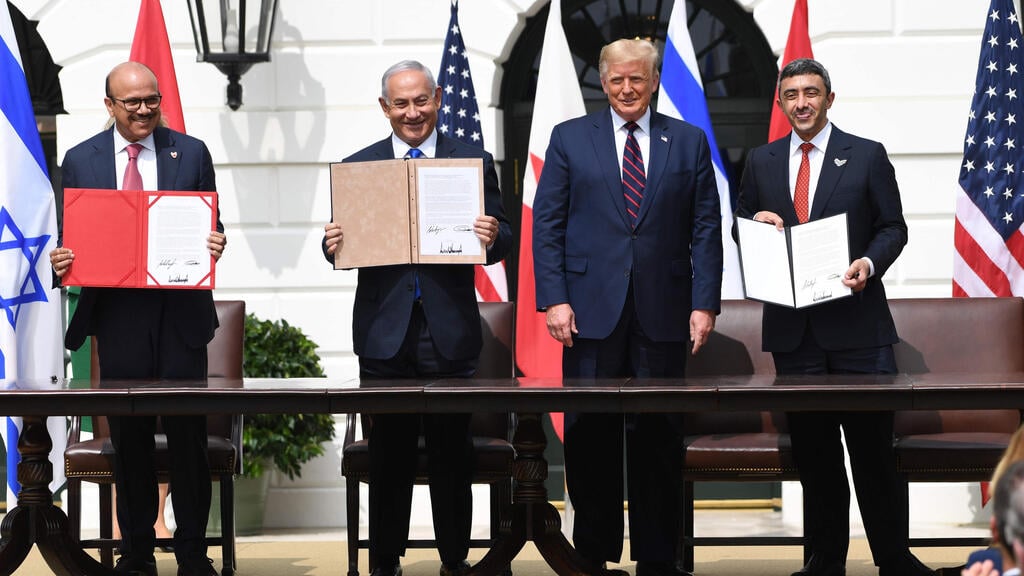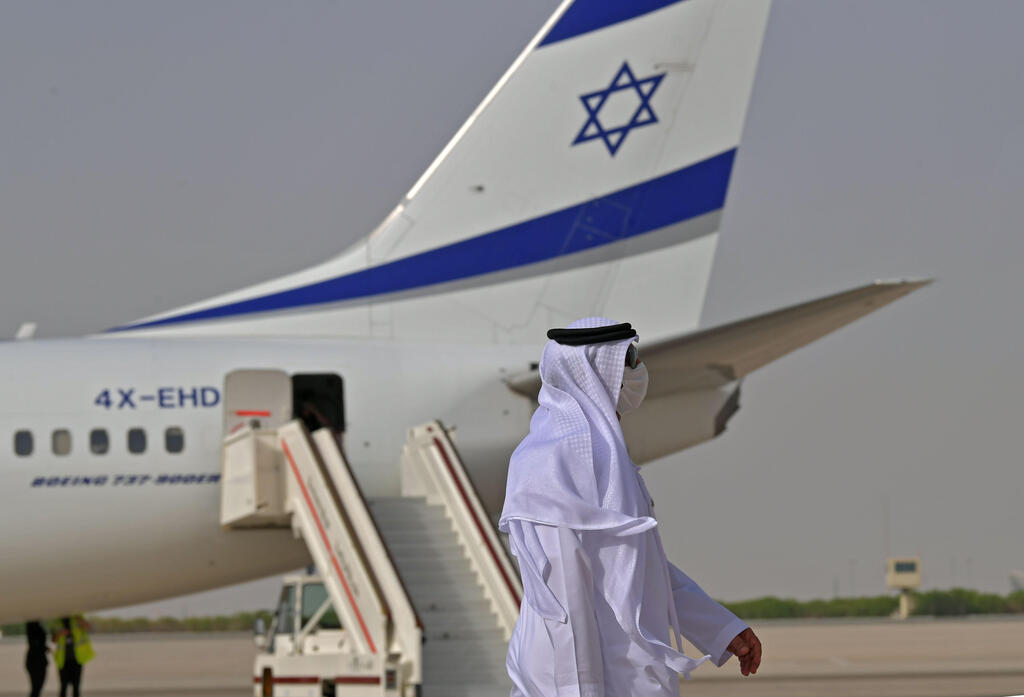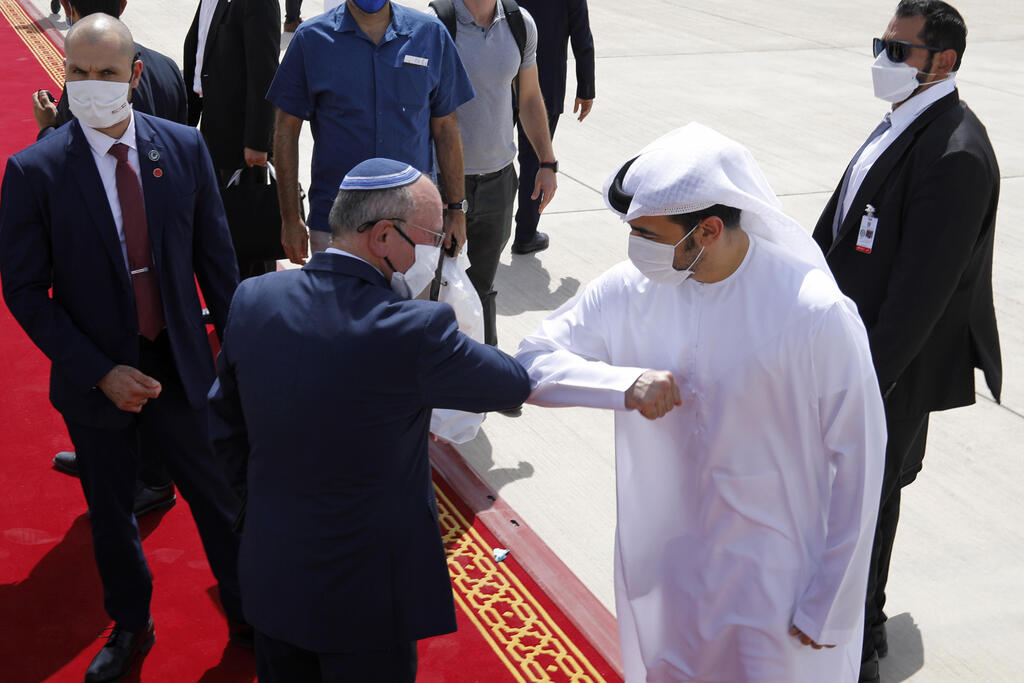After donning my tallit (prayer shawl) on the morning of the signing, I felt like I could not remove it.
I decided that the day would be a day of prayer for me, and a fast day from food until after the signing of Abraham Accord.
As a reminder to myself, I wore my tallit the entire morning in Washington, D.C., carrying my shofar with me as well.
4 View gallery


The Emirati, Israeli and U.S. flags fly from the window of an El Al plane adorned with the word 'peace' in Arabic, English and Hebrew, as it lands in Abu Dhabi
(Photo: AFP)
Why a day of prayer?
Over the past decades, the tent of Ishmael and the tent of Isaac have been pitched. The tent of Abraham, however, has fallen. This Accord is not simply a transaction, a deal, or a compromise. It is the pitching of the open tent of Abraham, with many countries raising the poles in unison.
The significance of this Accord is not to be found in some “room where it happened,” but in the doors it will open.
The political process is nothing more than one manifestation of the unfolding of a spiritual process much larger than any one person. The drama today is not to be found on the table where leaders signed a piece of paper, but in the millions around the world who looked on and felt the exuberance of a family reunion.
4 View gallery


L-R: Bahrain FM Abdullatif Alzayani, PM Benjamin Netanyahu, U.S. President Donald Trump and Emriati FM Abdullah bin Zayed Al Nahyan at the White House signing ceremony
(Photo: AFP)
To be sure, many will be skeptical of this agreement. Some might say that this agreement is only about fighting a shared enemy or creating financial benefit.
The truth is that this agreement is really about forging a shared future and kick-starting a cultural renaissance. The only mistake that will enable the skeptics will be in seeing this Accord as a contract, not a covenant.
Political analysts will draw up the balance sheets of mutual compromises, of gains and losses.
Economists will assess how this shifts the regional economies in energy, banking or tourism. If we do not don our spiritual lenses, we will lose the “Abraham” in the “Abraham Accord.”
I came to the United Arab Emirates for the first in January of 2010, possibly the first public visit of any rabbi in centuries. We landed in the morning, and the time for my morning prayers was due.
I turned into one of the Abu Dhabi airport lounges and donned my tefillin and tallit (accouterments of prayer). All of a sudden, I heard someone say in Hebrew, "baruch haba, welcome!"
4 View gallery


An Emirati official stands near the El Al plane that carried a U.S.-Israeli delegation to the Abu Dhabi last month
(Photo: AFP)
A passing flight attendant, who grew up in Morocco next to a Jewish family, had remembered all of the appropriate greetings and recognized the paraphernalia.
“It’s a little noisy here for prayer,” she said. “There is a better place over there,” she added, as she guided me to a different part of the lounge.
When we see each other in prayer, we can guide each other to better places. There’s a better place over there.
Almost a decade later I met Ambassador Lana Nussiebeh, permanent representative of UAE to the United Nations. She invited me to speak at an event at the UN headquarters in New York where ambassadors from over fifty Muslim or Muslim-majority countries were in attendance.
Recently appointed chief rabbi, I shared the story of the survival of my wife’s family under the protection of a Muslim doctor in Berlin during the Holocaust. Lana described the legacy of the Nusseibeh clan, Muslim guardians of the key to the Church of the Holy Sepulcher in Jerusalem.
4 View gallery


Israeli and Emirati officials bump elbows in farewell at the close of the historic visit to Abu Dhabi
(Photo: EPA)
The different strands of family tradition of mutual respect and tolerance should be separate no longer. We must re-weave the line of Abraham.
Flying from the United States to the UAE with the first American Jewish delegation to do so after the signing, it was moving to realize that along with those with whom I was traveling, representatives from the Jewish Federations of North America, were not simply coming to the UAE to meet officials.
We, and those who will follow, are coming to adorn the newly pitched tent of Abraham.
This day for me is a day of prayer, a day in which prayers shall be heard, seen, raised up and answered. It is an opening of the door to the better place.
Rabbi Yehuda Sarna is chief rabbi of the United Arab Emirates and executive director of the Bronfman Center for Jewish Student Life at New York University
Reprinted with permission from The Media Line

